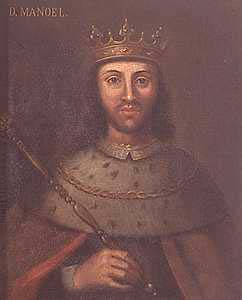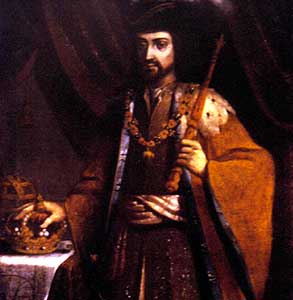<Back to Index>
- Explorer Francisco Pascacio Moreno, 1852
- Painter Walter Richard Sickert, 1860
- King of Portugal and the Algarves Manuel I, 1469
PAGE SPONSOR


Manuel I (Archaic Portuguese: Manoel I, English: Emmanuel I), the Fortunate (Port. o Venturoso), 14th king of Portugal and the Algarves (Alcochete, May 31, 1469 – December 13, 1521 in Lisbon) was the son of Infante Fernando, Duke of Viseu, (1433 - 1470), by his wife, Infanta Beatriz of Portugal.
His mother was the granddaughter of King John I of Portugal; his father, Prince Fernando, was the second surviving son of King Edward of Portugal, being thus the cadet brother of King Afonso V of Portugal. Manuel succeeded his first cousin King John II of Portugal, who was also his brother-in-law, in 1495.
Manuel grew up among the conspiracies of the aristocratic high nobility against king John II. He watched many people being killed and exiled. His older brother Diogo, the duke of Viseu, had been murdered in 1484 by the king himself. Thus, when receiving a royal order in 1493 to present himself to the king, Manuel had every reason to worry. Without reason: John II wanted to name him heir to the throne, after the death of his son, Prince Afonso, and the failed attempts to legitimise Jorge, Duke of Coimbra, his illegitimate son. As a result of this stroke of luck he was nicknamed the Fortunate.
Manuel would prove a worthy successor to his cousin King John II, supporting the Portuguese exploration of the Atlantic Ocean and the development of Portuguese commerce. During his reign, the following was achieved:
- 1498 — Vasco da Gama discovers the maritime route to India
- 1500 — Pedro Álvares Cabral discovers Brazil
- 1505 — Francisco de Almeida becomes the first viceroy of India
- 1503 - 1515 — Afonso de Albuquerque, an admiral, secures the monopoly of the Indian ocean and Persian Gulf maritime routes for Portugal
All these events made Portugal rich on foreign trade whilst formally establishing its empire. Manuel used the wealth to build a number of royal buildings (in the Manueline style) and to attract scientists and artists to his court. Commercial treaties and diplomatic alliances were forged with China and the Persian Empire. The Pope received a monumental embassy from Portugal during his reign, designed to be a show of the newly acquired riches to all Europe.
In Manuel's reign, royal absolutism was the method of government. The Cortes (assembly of the kingdom) only met three times during his reign, always in Lisbon, the king's seat. He reformed the courts of justice and the municipal charters with the crown, modernizing taxes and the concepts of tributes and rights.
Manuel was a very religious man and invested a large amount of Portuguese income to sponsor missionaries in their journeys to the new colonies, such as Francisco Álvares, and the construction of religious buildings, such as the Monastery of Jerónimos. Manuel also endeavoured to promote another crusade, against the Turks.
His relationship with the Portuguese Jews started out well. At the outset of his reign, he released all the Jews who had been made captive during the reign of João II. Unfortunately for the Jews, he decided that he wanted to marry Infanta Isabella of Aragon, then heiress of the future united crown of Spain (widow of his nephew Prince Afonso). Ferdinand and Isabella had expelled the Jews in 1492, and would never marry their daughter to the king of a country that still tolerated their presence. In December 1496, it was decreed that any Jew who did not convert to Christianity would be expelled from the country. However, those expelled could only leave the country in ships specified by the king. When those who chose expulsion arrived at the port in Lisbon, they were met by clerics and soldiers who used force, coercion, and promises in order to baptize them and prevent them from leaving the country. This period of time technically ended the presence of Jews in Portugal. Afterwards, all converted Jews and their descendants would be referred to as "New Christians", and they were given a grace period of thirty years in which no inquiries into their faith would be allowed; this was later to extended to end in 1534.
A popular riot in 1504 ended in the death of two thousand Jews; the leaders of this riot were executed by Manuel. In recent years, Portugal attempted to atone for the expulsion of the Jews. In a ceremony, Justice Minister José Eduardo Vera Jardim called the expulsion of Portugal's Jews a black piece of our history. The state, he said, owes Jews moral reparation for centuries of brutal persecution. (New York Times, December 6, 1996).
Isabella died in childbirth in 1498, putting a damper on Portuguese ambitions to rule in Spain, which various rulers had had since the reign of Fernando I (1367 - 1383). Manuel and Isabella's young son Miguel was for a period the heir apparent of Castile and Aragon, but his death in 1500 ended these ambitions. Manuel's next wife, Maria of Aragon, was also a Spanish princess, but not the oldest. This was Joanna of Castile, known as Joanna the Mad.
In 1506 the Pope Julius II gave Manuel I a Golden Rose.
The Jerónimos Monastery in Lisbon houses Manuel's tomb. His son João succeeded him as king.